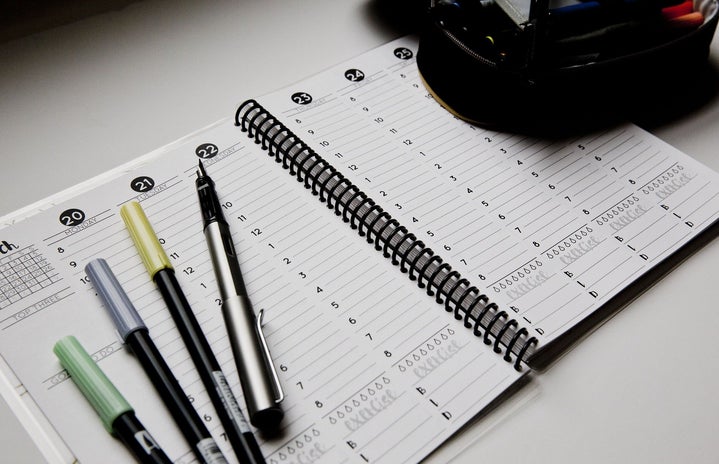As students, we have a lot on our plates. Trying to meet the demands of work and school while maintaining some kind of social life, it’s quite clear we’ve got our hands full. It seems nearly impossible and at some point in time we will all reach a peak where balancing all aspects of our lives becomes unbearable. I myself can admit I am a high-achiever and perfectionist, maybe even a bit of a workaholic, but I’m managing to complete a double major while working a part time job, running a mental health club and writing for Her Campus… or at least I think I’m managing. If you’re anything like myself, possessing characteristics of a type A personality, you’ve most likely already experienced burnout at one point or another. Yet, even if you consider yourself to be more laid-back, we eventually all reach our limits. Burnout is a relatively recent term coined by psychologist Herbert Freudenberger and is defined as a state of emotional, mental and physical exhaustion caused by chronic stress. Most of the time, we are so caught up in our daily routines that we fail to acknowledge the signs of burnout by choosing to ignore them, or we’re just simply not aware of them because we’re too preoccupied. Here are a few signs which indicate you are experiencing burnout.
- Alienation
-
When we are overwhelmed, we tend to disassociate ourselves from our environments, whether it be at home, school or work. We dread having to go anywhere. If you’re already having to drag yourself out of bed each morning, you’re already close to burning out. The moment you start skipping lectures and stop showing up to places you know you should be, it is a clear indication you’re suffering from burnout. While doing this, we also isolate ourselves from our relationships. We disconnect by refusing to answer phone calls and by not responding to messages. It’s okay to take a break every now and then to unplug and rejuvenate, but if you’ve been M.I.A for a while and the world’s concerned about your whereabouts, it’s time to check-in with yourself.
- Loss of enjoyment and motivation
-
Another result of burnout is losing enjoyment in the things we love. All of our activities that we once viewed as exciting and pleasurable just seem to make us feel unfulfilled, either because we are unsatisfied with our progress or find it meaningless. Burnout is not to be confused with stress. When we are stressed, we exhibit a loss of energy through continuous over-engaging, yet we still pull through. However, when we are burnt out from prolonged periods of stress, we begin to disengage. Everything seems pointless and hopeless, so we start to retreat and give up. We become unsatisfied and sense no joy in life. Be particularly careful of this one, as it can lead to depression.
- Lack of concentration
-
When we are burnt out, we may experience short attention spans and loss of focus. This is a result of cognitive impairment that can range from mild to severe and is common with aging. Chances are if you’ve forgotten your best friend’s birthday at the age of 22, there’s probably other things on your mind. When we encounter a stress stimulus, we focus all of our mental energy into trying to challenge the task at hand so much so that we don’t even retain anything else happening around us. Even if we are not particularly confronting the challenge at hand, such as that final project due next week, it’s all we can seem to think about. This mental drainage makes retrieving and encoding new information far more difficult, making us forgetful of even the slightest things, such as um…what was it again?
- Easily irritated and angered
-
We experience thousands of emotions in a single day, but if you are constantly fluctuating between the same negative emotions, it may be an indication of burnout. You may begin to have more pessimistic thoughts and negative self talk. Usually, this is a result of being unsatisfied with our work performance. These internal frustrations caused by not meeting our goals pave the path towards irritation, and soon enough, everything and everyone around us become irritating, like the subway delay or the person next to us who just seems to breathe way too loudly. When irritation escalates, it can lead to violent outbursts which may be taken out on people who don’t deserve it. It’s important to be able to regulate your emotions and be attuned to them, just because this anger may have stemmed from something deeper, such as anxiety or lack of sleep, and not necessarily the minor source at hand.
- Insomnia and chronic fatigue
-
Insomnia and chronic fatigue go hand in hand; you’re always tired because you’re overexerting yourself throughout the day, and as much as you want to sleep when it’s time to unwind, you just can’t. It seems like a constant endless cycle. In the beginning, you may just have trouble falling asleep or staying asleep because you’re anxious about your midterm or that big job interview, which is totally not unusual. But when one night becomes two, then three, and you suddenly come to terms with the fact that you can’t recall the last time you got a full night’s rest, it’s definitely worth checking out. Especially if you find yourself staying up with no particular reason to do so.
- Physical symptoms
-
Although we may perceive burnout to be a form of mental distress, our bodies give off physical signals produced by stress hormones. Fun fact, these hormones are the same hormones that trigger our flight or fight response, which I’m sure we’ve all heard of if you’ve taken any intro to biology class. This is the body’s way of reacting to what it perceives to be a threat. Some side effects of burnout include chest pain, shortness of breath, headaches, stomach aches and dizziness that can result from long exposures to stress. If symptoms are chronic, it is important to consult a doctor right away.
- Neglecting yourself
-
You’ve probably heard about how taking time for yourself is crucial and how important it is to practice self care, yet we are so caught up with our busy schedules that we put ourselves last. When we are consumed by burnout, we lean towards unhealthy habits to help us cope. These may include smoking, excessive drinking, binge eating and drugs. As Jim Rohn says, “Take care of your body. It’s the only place you have to live.”
Of course, we all will be exposed to burnout signals at some point in our lives, however it is important to note that when these symptoms are becoming consistent, it could be detrimental to our health. A lot of times we take on more than we can handle, thinking we have the power to do everything at once, but our behaviour and bodies will tell us otherwise. As students, we are faced with our own internal pressures along with societal standards when it comes to school, work, clubs/teams, relationships and so much more. The first part of overcoming burnout is to be able to recognize the signs, and even if you cannot see them yourself, a good friend or family member will. It’s okay to admit that you feel exhausted and overwhelmed. Furthermore, understand that it is okay to take a break and say no. Setting boundaries is extremely important! If you know you already have your hands full, don’t take on new commitments. Also, being able to prioritize your time is crucial, even if you have to make some sacrifices in the process. Just remember, your body speaks and you should listen.



